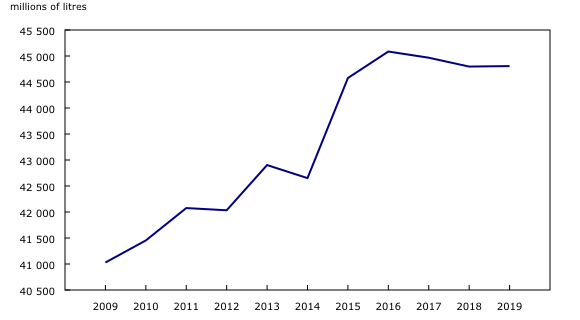Gasoline sales flat in 2019
Archived Content
Information identified as archived is provided for reference, research or recordkeeping purposes. It is not subject to the Government of Canada Web Standards and has not been altered or updated since it was archived. Please "contact us" to request a format other than those available.
Released: 2020-09-28
44.8 billion litres
2019
0.0% 
(annual change)
Even before the economic impact of COVID-19 was felt, the last two years have seen little change in the sale of gasoline on which road taxes were paid. In 2019, the total gross sales of gasoline in Canada remained essentially the same at 44.8 billion litres, following a slight decrease (-0.4%) in 2018.
Gas sales remain flat
Annual sales of gasoline peaked at just over 45.0 billion litres in 2016. Since reaching this peak, sales have continued to stagnate despite there being a record number of motor vehicles registered in Canada.
On September 10, Statistics Canada reported a total of 35.7 million motor vehicle registrations in 2019. Light vehicles, consisting of passenger cars, light trucks and vans weighing less than 4,500 kilograms, account for roughly two-thirds of the total.
While more vehicles registered with stagnating gasoline sales implies improved fuel efficiency, the evidence is mixed. In 2019, there was strong growth in new registrations (i.e. first time) of full battery and hybrid electric vehicles, along with a 5.0% decline in new gasoline-powered vehicles.
However, multipurpose vehicles (a category that includes sport utility vehicles and crossovers) continued to be the most popular new motor vehicle type registered in Canada, up 1.5% in 2019, while registrations of new pick-up trucks rose 1.0%.
Sales fall in Ontario and Alberta
Ontario, Quebec, Alberta and British Columbia together account for over 80% of the gross sales of gasoline in Canada. In 2019, however, sales declined from 2018 in both Ontario (down 141.4 million litres or 0.8%) and in Alberta (down 119.2 million litres or 1.8%).
On a country-wide basis, the net sales of diesel oil decreased to 17.8 billion litres, down 2.3% (-420.7 million litres), compared with the increase in 2018 of 1.1% (+200.8 million litres). Among new motor vehicles registered in 2019, new diesel-powered vehicles declined by 17.6%.
A look ahead
With COVID-19 hitting the travel and transportation industries particularly hard, there is reason to expect sales of motor vehicle fuel will continue to stall. In its 2020 Energy Outlook, released on September 14, energy company BP notes that global economic activity will partly recover from the COVID-19 pandemic over the next few years.
However, BP predicts that COVID-19 effects will weaken energy demand and that fossil fuel consumption will begin to shrink for the first time in modern history. While overall energy demand will continue to grow, supply will change with the role of fossil fuels decreasing, driven in part by an increase in electric—and more efficient—vehicles.
Note to readers
The purpose of this survey is to collect data on gasoline and other petroleum fuels sold in Canada. Survey data are used by the Department of Finance for the calculation of fiscal equalization payments to the provinces pursuant to the Federal-Provincial Fiscal Arrangements Act and territorial financing for the territories.
Motor vehicle fuel sales data are available from 1987 for Canada as well as provinces and territories.
The Transportation Data and Information Hub, a web portal developed jointly by Statistics Canada and Transport Canada, provides Canadians with online access to comprehensive statistics and measures on the country's transportation sector.
Contact information
For more information, or to enquire about the concepts, methods or data quality of this release, contact us (toll-free 1-800-263-1136; 514-283-8300; STATCAN.infostats-infostats.STATCAN@canada.ca) or Media Relations (613-951-4636; STATCAN.mediahotline-ligneinfomedias.STATCAN@canada.ca).
- Date modified:


